PESTLE Analysis: Thailand Market Entry for Pollution-Eating Bikes
VerifiedAdded on 2021/04/21
|14
|3111
|158
Report
AI Summary
This report presents a PESTLE analysis, a strategic tool used to evaluate the external environment of a business, focusing on political, economic, social, technological, legal, and environmental factors. The report examines the strengths and weaknesses of the PESTLE framework, emphasizing its cost-effectiveness and ability to provide a comprehensive understanding of external influences. The core of the report applies the PESTLE framework to Thailand, assessing the country's suitability for the market entry of "pollution-eating bikes" developed by a Chinese company. The analysis considers Thailand's political stability, economic growth, and environmental challenges, including air and water pollution, to determine the opportunities and risks associated with the expansion. The report highlights Thailand's strong economic growth, export-dependent economy, and environmental initiatives, while also acknowledging the country's political instability and environmental concerns. Finally, the report offers recommendations for the Chinese organization to successfully establish its business in Thailand, considering the country's unique market dynamics and challenges.
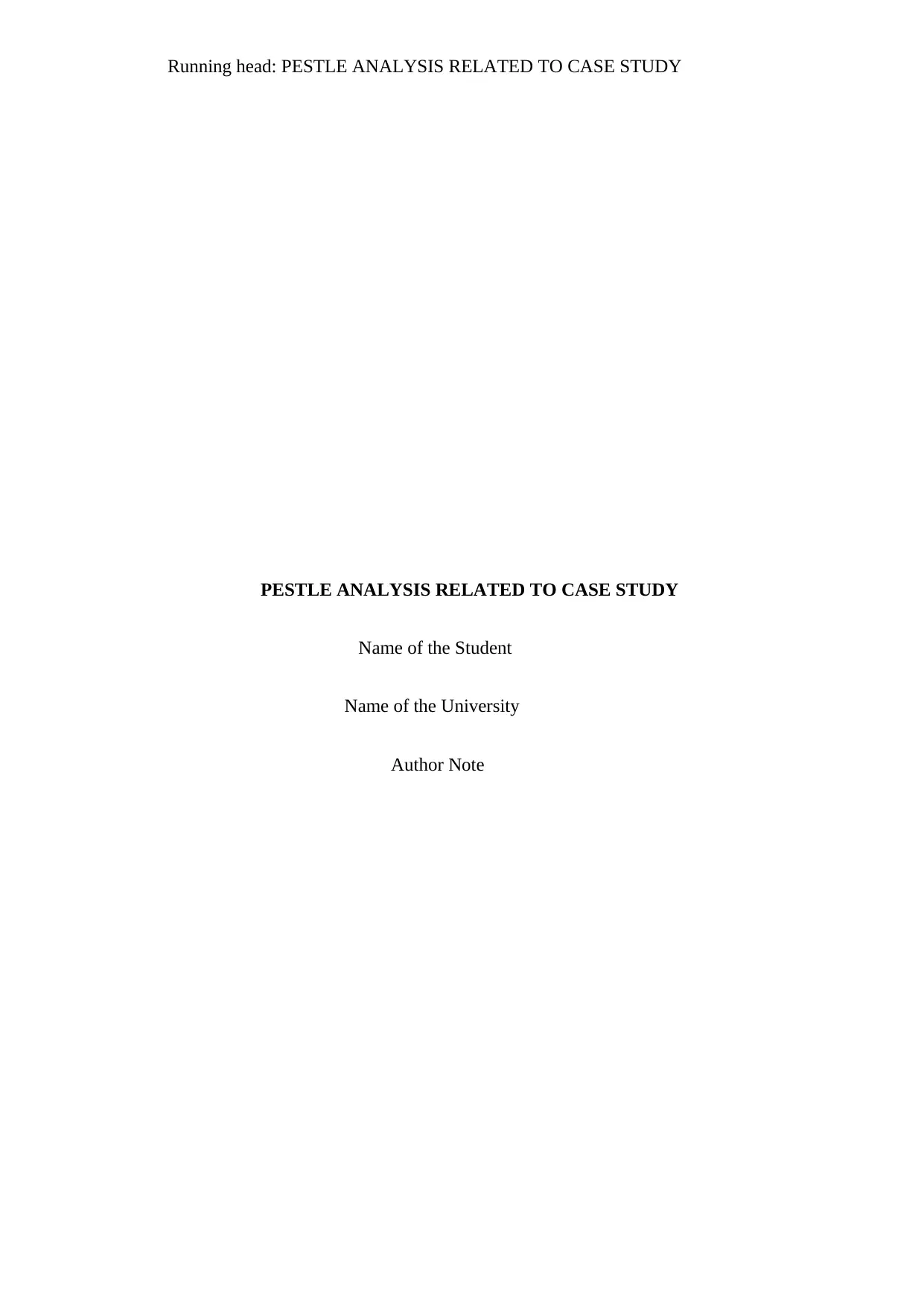
Running head: PESTLE ANALYSIS RELATED TO CASE STUDY
PESTLE ANALYSIS RELATED TO CASE STUDY
Name of the Student
Name of the University
Author Note
PESTLE ANALYSIS RELATED TO CASE STUDY
Name of the Student
Name of the University
Author Note
Paraphrase This Document
Need a fresh take? Get an instant paraphrase of this document with our AI Paraphraser
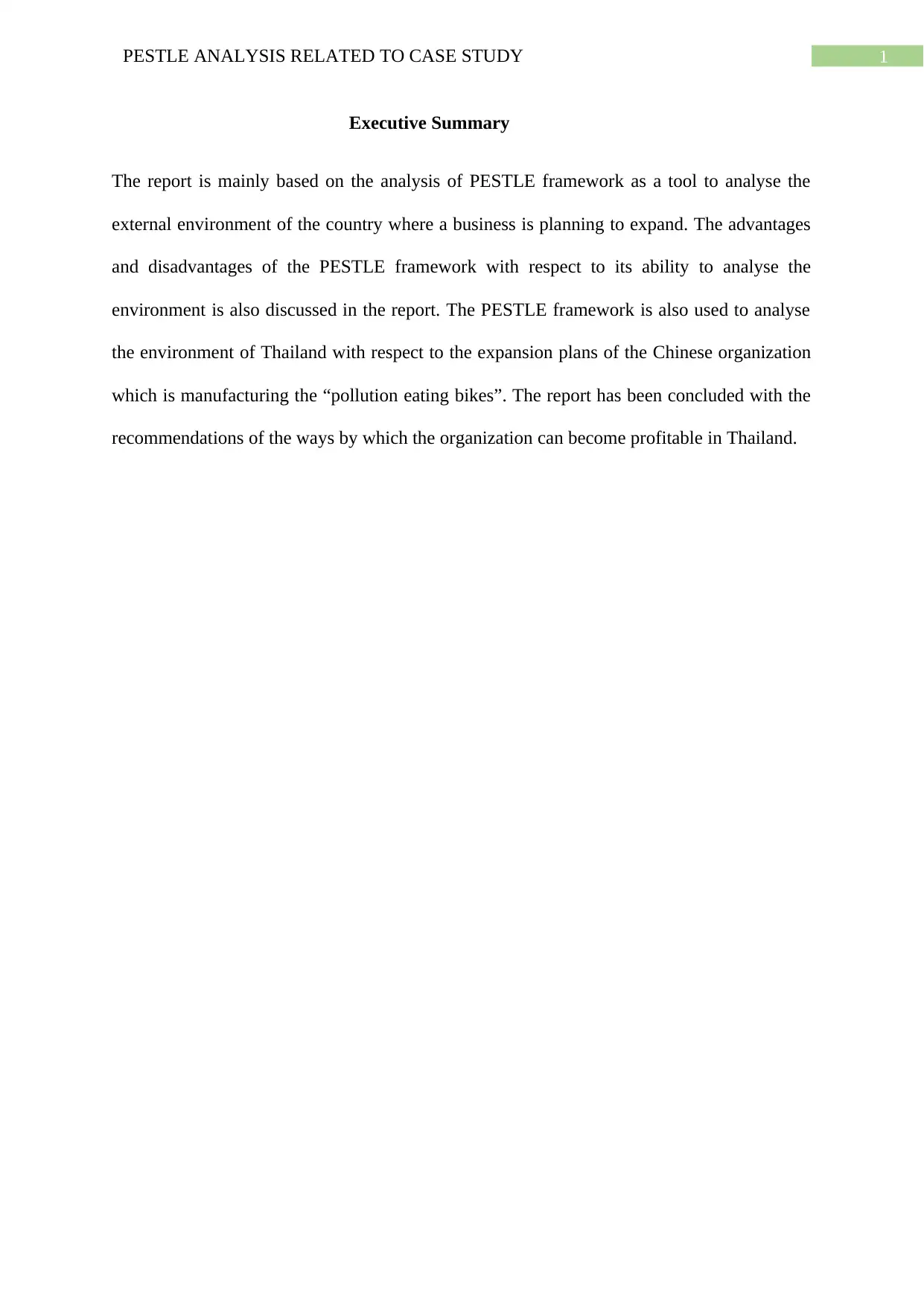
1PESTLE ANALYSIS RELATED TO CASE STUDY
Executive Summary
The report is mainly based on the analysis of PESTLE framework as a tool to analyse the
external environment of the country where a business is planning to expand. The advantages
and disadvantages of the PESTLE framework with respect to its ability to analyse the
environment is also discussed in the report. The PESTLE framework is also used to analyse
the environment of Thailand with respect to the expansion plans of the Chinese organization
which is manufacturing the “pollution eating bikes”. The report has been concluded with the
recommendations of the ways by which the organization can become profitable in Thailand.
Executive Summary
The report is mainly based on the analysis of PESTLE framework as a tool to analyse the
external environment of the country where a business is planning to expand. The advantages
and disadvantages of the PESTLE framework with respect to its ability to analyse the
environment is also discussed in the report. The PESTLE framework is also used to analyse
the environment of Thailand with respect to the expansion plans of the Chinese organization
which is manufacturing the “pollution eating bikes”. The report has been concluded with the
recommendations of the ways by which the organization can become profitable in Thailand.
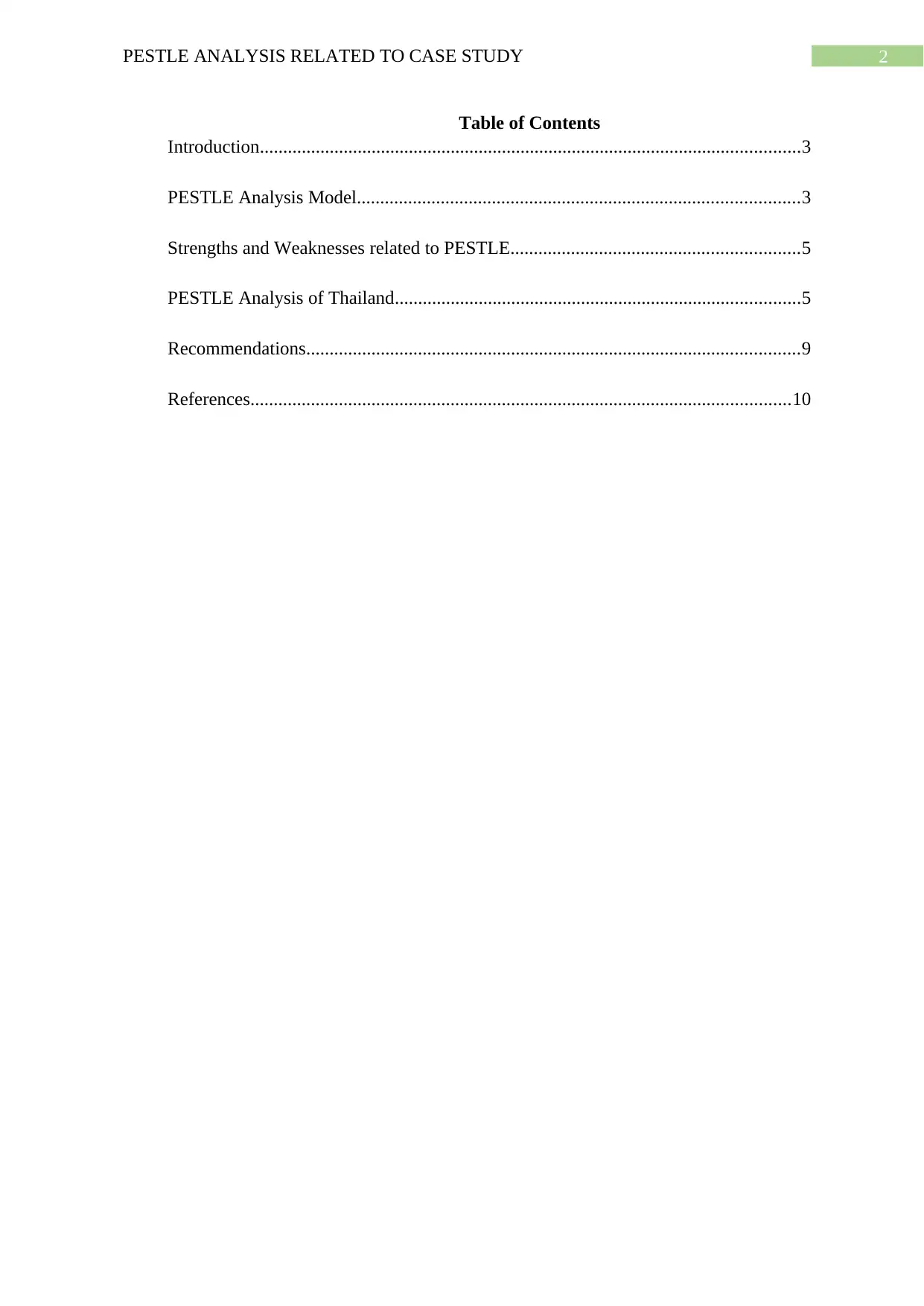
2PESTLE ANALYSIS RELATED TO CASE STUDY
Table of Contents
Introduction....................................................................................................................3
PESTLE Analysis Model...............................................................................................3
Strengths and Weaknesses related to PESTLE..............................................................5
PESTLE Analysis of Thailand.......................................................................................5
Recommendations..........................................................................................................9
References....................................................................................................................10
Table of Contents
Introduction....................................................................................................................3
PESTLE Analysis Model...............................................................................................3
Strengths and Weaknesses related to PESTLE..............................................................5
PESTLE Analysis of Thailand.......................................................................................5
Recommendations..........................................................................................................9
References....................................................................................................................10
⊘ This is a preview!⊘
Do you want full access?
Subscribe today to unlock all pages.

Trusted by 1+ million students worldwide
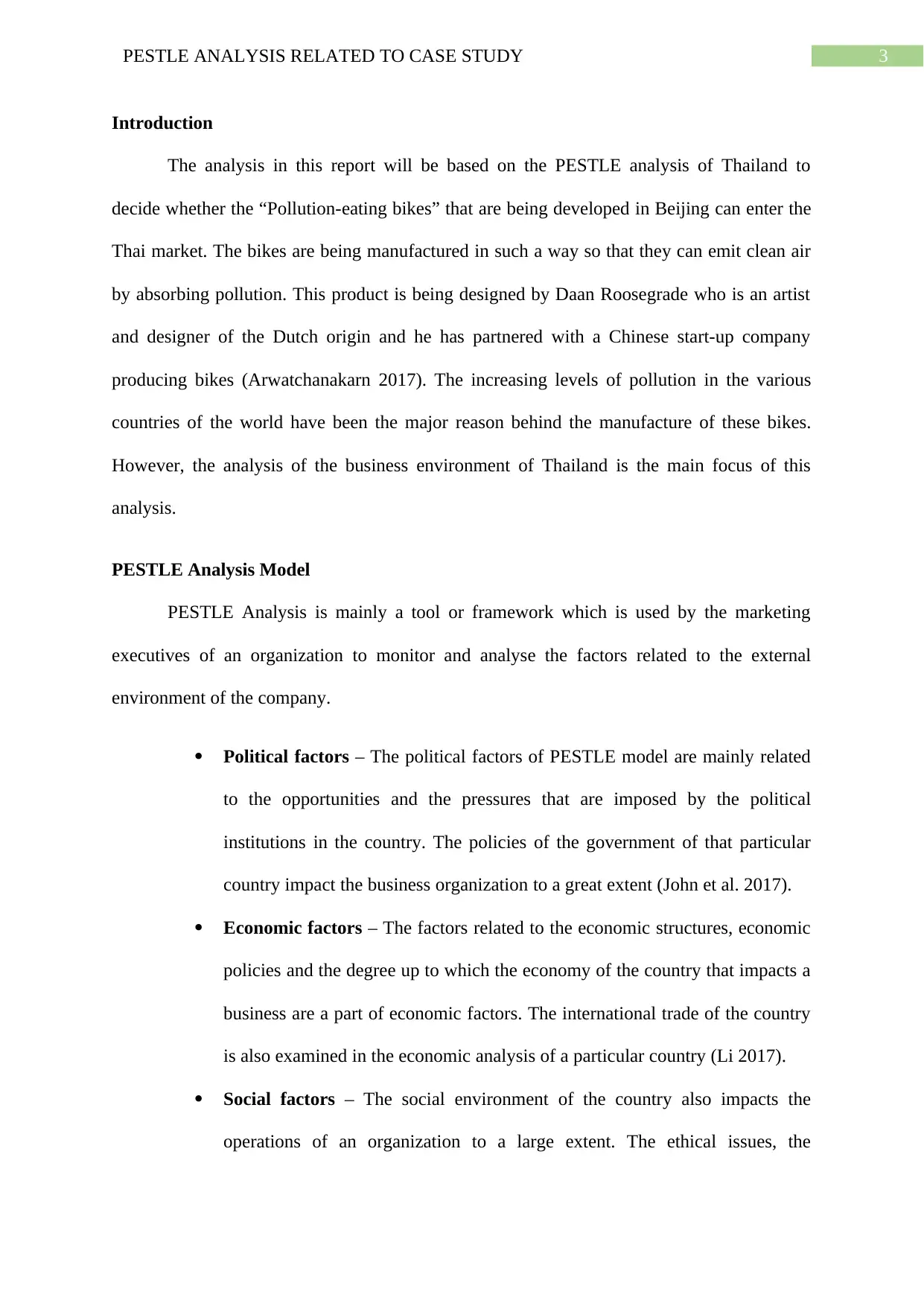
3PESTLE ANALYSIS RELATED TO CASE STUDY
Introduction
The analysis in this report will be based on the PESTLE analysis of Thailand to
decide whether the “Pollution-eating bikes” that are being developed in Beijing can enter the
Thai market. The bikes are being manufactured in such a way so that they can emit clean air
by absorbing pollution. This product is being designed by Daan Roosegrade who is an artist
and designer of the Dutch origin and he has partnered with a Chinese start-up company
producing bikes (Arwatchanakarn 2017). The increasing levels of pollution in the various
countries of the world have been the major reason behind the manufacture of these bikes.
However, the analysis of the business environment of Thailand is the main focus of this
analysis.
PESTLE Analysis Model
PESTLE Analysis is mainly a tool or framework which is used by the marketing
executives of an organization to monitor and analyse the factors related to the external
environment of the company.
Political factors – The political factors of PESTLE model are mainly related
to the opportunities and the pressures that are imposed by the political
institutions in the country. The policies of the government of that particular
country impact the business organization to a great extent (John et al. 2017).
Economic factors – The factors related to the economic structures, economic
policies and the degree up to which the economy of the country that impacts a
business are a part of economic factors. The international trade of the country
is also examined in the economic analysis of a particular country (Li 2017).
Social factors – The social environment of the country also impacts the
operations of an organization to a large extent. The ethical issues, the
Introduction
The analysis in this report will be based on the PESTLE analysis of Thailand to
decide whether the “Pollution-eating bikes” that are being developed in Beijing can enter the
Thai market. The bikes are being manufactured in such a way so that they can emit clean air
by absorbing pollution. This product is being designed by Daan Roosegrade who is an artist
and designer of the Dutch origin and he has partnered with a Chinese start-up company
producing bikes (Arwatchanakarn 2017). The increasing levels of pollution in the various
countries of the world have been the major reason behind the manufacture of these bikes.
However, the analysis of the business environment of Thailand is the main focus of this
analysis.
PESTLE Analysis Model
PESTLE Analysis is mainly a tool or framework which is used by the marketing
executives of an organization to monitor and analyse the factors related to the external
environment of the company.
Political factors – The political factors of PESTLE model are mainly related
to the opportunities and the pressures that are imposed by the political
institutions in the country. The policies of the government of that particular
country impact the business organization to a great extent (John et al. 2017).
Economic factors – The factors related to the economic structures, economic
policies and the degree up to which the economy of the country that impacts a
business are a part of economic factors. The international trade of the country
is also examined in the economic analysis of a particular country (Li 2017).
Social factors – The social environment of the country also impacts the
operations of an organization to a large extent. The ethical issues, the
Paraphrase This Document
Need a fresh take? Get an instant paraphrase of this document with our AI Paraphraser
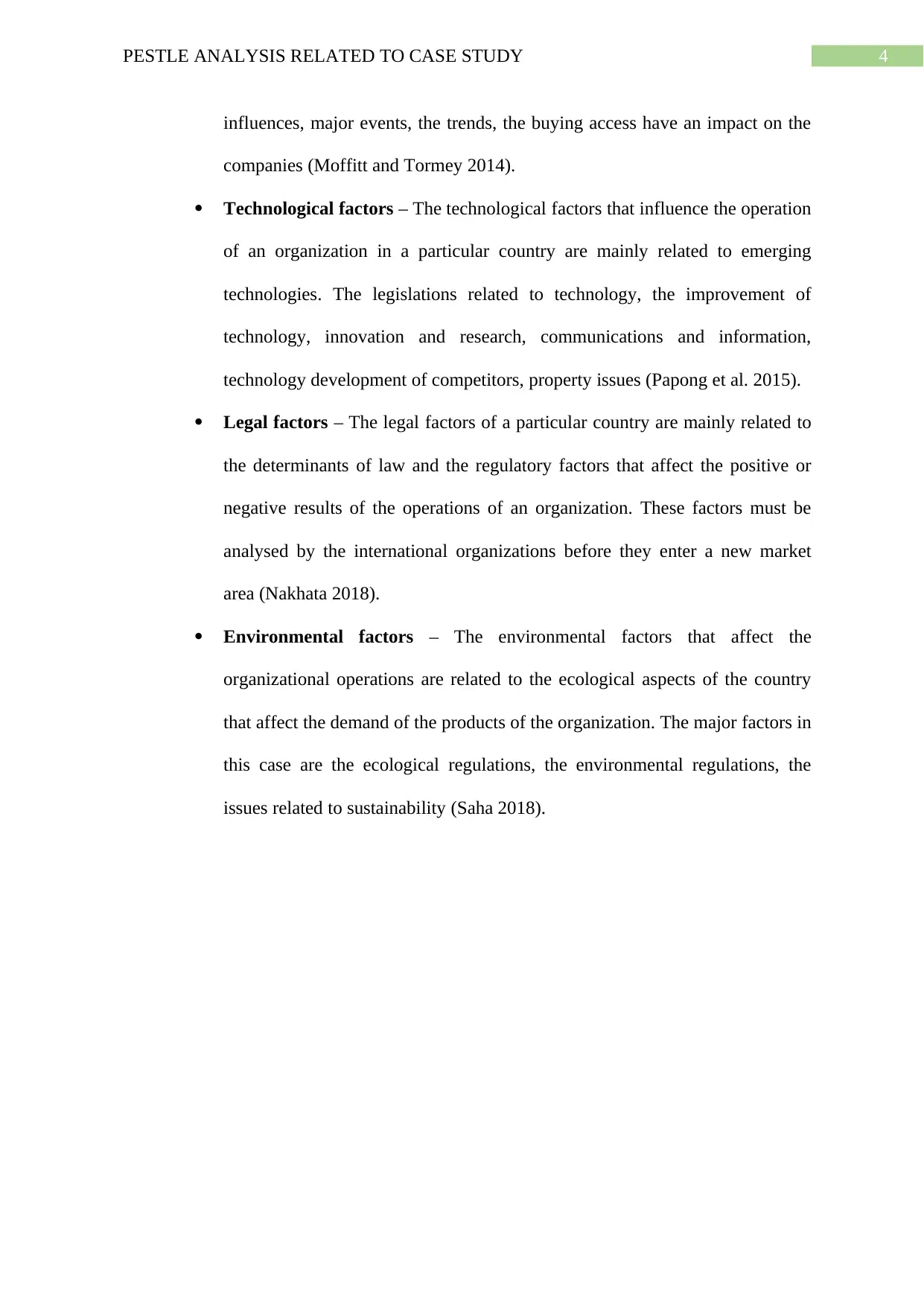
4PESTLE ANALYSIS RELATED TO CASE STUDY
influences, major events, the trends, the buying access have an impact on the
companies (Moffitt and Tormey 2014).
Technological factors – The technological factors that influence the operation
of an organization in a particular country are mainly related to emerging
technologies. The legislations related to technology, the improvement of
technology, innovation and research, communications and information,
technology development of competitors, property issues (Papong et al. 2015).
Legal factors – The legal factors of a particular country are mainly related to
the determinants of law and the regulatory factors that affect the positive or
negative results of the operations of an organization. These factors must be
analysed by the international organizations before they enter a new market
area (Nakhata 2018).
Environmental factors – The environmental factors that affect the
organizational operations are related to the ecological aspects of the country
that affect the demand of the products of the organization. The major factors in
this case are the ecological regulations, the environmental regulations, the
issues related to sustainability (Saha 2018).
influences, major events, the trends, the buying access have an impact on the
companies (Moffitt and Tormey 2014).
Technological factors – The technological factors that influence the operation
of an organization in a particular country are mainly related to emerging
technologies. The legislations related to technology, the improvement of
technology, innovation and research, communications and information,
technology development of competitors, property issues (Papong et al. 2015).
Legal factors – The legal factors of a particular country are mainly related to
the determinants of law and the regulatory factors that affect the positive or
negative results of the operations of an organization. These factors must be
analysed by the international organizations before they enter a new market
area (Nakhata 2018).
Environmental factors – The environmental factors that affect the
organizational operations are related to the ecological aspects of the country
that affect the demand of the products of the organization. The major factors in
this case are the ecological regulations, the environmental regulations, the
issues related to sustainability (Saha 2018).
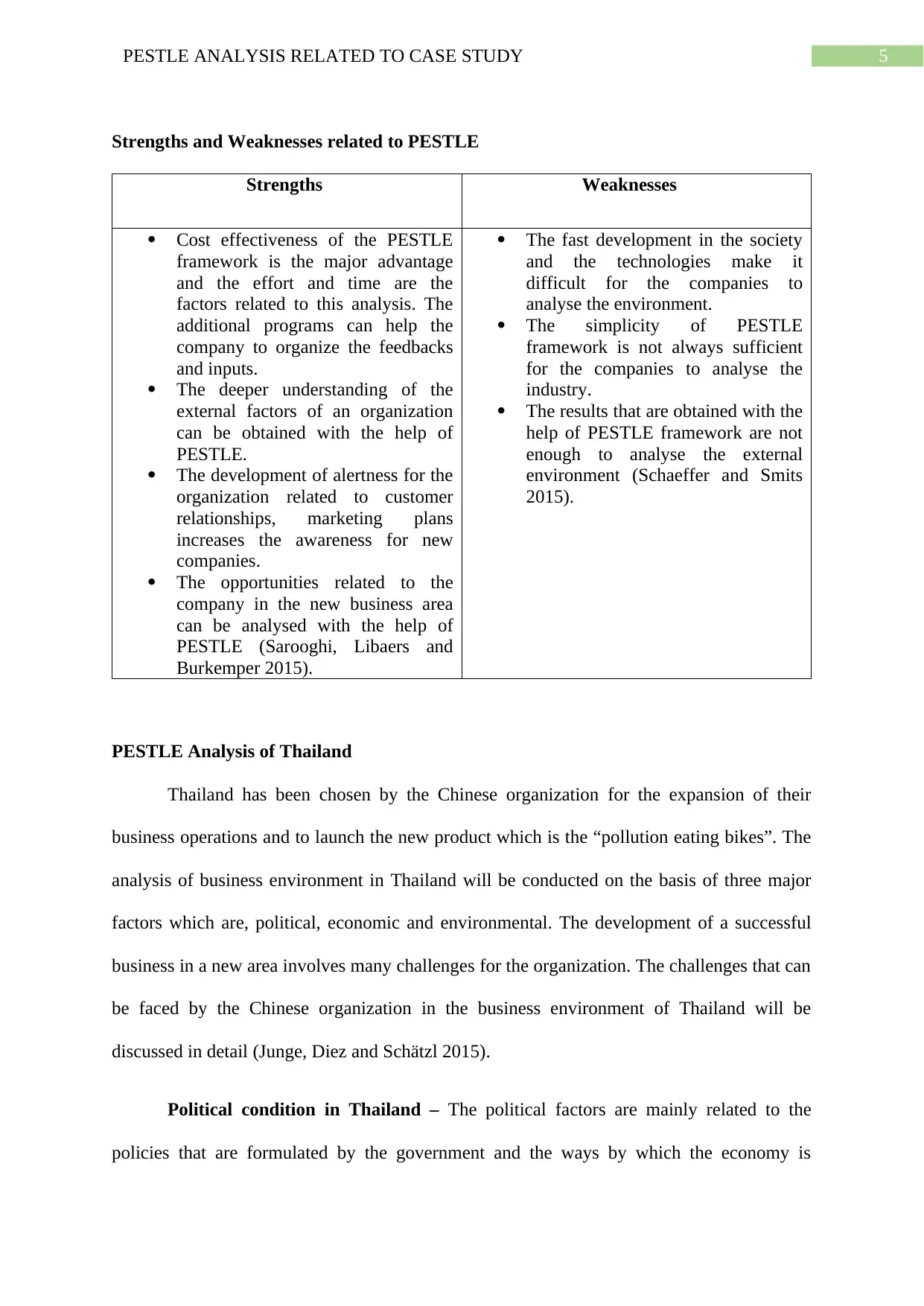
5PESTLE ANALYSIS RELATED TO CASE STUDY
Strengths and Weaknesses related to PESTLE
Strengths Weaknesses
Cost effectiveness of the PESTLE
framework is the major advantage
and the effort and time are the
factors related to this analysis. The
additional programs can help the
company to organize the feedbacks
and inputs.
The deeper understanding of the
external factors of an organization
can be obtained with the help of
PESTLE.
The development of alertness for the
organization related to customer
relationships, marketing plans
increases the awareness for new
companies.
The opportunities related to the
company in the new business area
can be analysed with the help of
PESTLE (Sarooghi, Libaers and
Burkemper 2015).
The fast development in the society
and the technologies make it
difficult for the companies to
analyse the environment.
The simplicity of PESTLE
framework is not always sufficient
for the companies to analyse the
industry.
The results that are obtained with the
help of PESTLE framework are not
enough to analyse the external
environment (Schaeffer and Smits
2015).
PESTLE Analysis of Thailand
Thailand has been chosen by the Chinese organization for the expansion of their
business operations and to launch the new product which is the “pollution eating bikes”. The
analysis of business environment in Thailand will be conducted on the basis of three major
factors which are, political, economic and environmental. The development of a successful
business in a new area involves many challenges for the organization. The challenges that can
be faced by the Chinese organization in the business environment of Thailand will be
discussed in detail (Junge, Diez and Schätzl 2015).
Political condition in Thailand – The political factors are mainly related to the
policies that are formulated by the government and the ways by which the economy is
Strengths and Weaknesses related to PESTLE
Strengths Weaknesses
Cost effectiveness of the PESTLE
framework is the major advantage
and the effort and time are the
factors related to this analysis. The
additional programs can help the
company to organize the feedbacks
and inputs.
The deeper understanding of the
external factors of an organization
can be obtained with the help of
PESTLE.
The development of alertness for the
organization related to customer
relationships, marketing plans
increases the awareness for new
companies.
The opportunities related to the
company in the new business area
can be analysed with the help of
PESTLE (Sarooghi, Libaers and
Burkemper 2015).
The fast development in the society
and the technologies make it
difficult for the companies to
analyse the environment.
The simplicity of PESTLE
framework is not always sufficient
for the companies to analyse the
industry.
The results that are obtained with the
help of PESTLE framework are not
enough to analyse the external
environment (Schaeffer and Smits
2015).
PESTLE Analysis of Thailand
Thailand has been chosen by the Chinese organization for the expansion of their
business operations and to launch the new product which is the “pollution eating bikes”. The
analysis of business environment in Thailand will be conducted on the basis of three major
factors which are, political, economic and environmental. The development of a successful
business in a new area involves many challenges for the organization. The challenges that can
be faced by the Chinese organization in the business environment of Thailand will be
discussed in detail (Junge, Diez and Schätzl 2015).
Political condition in Thailand – The political factors are mainly related to the
policies that are formulated by the government and the ways by which the economy is
⊘ This is a preview!⊘
Do you want full access?
Subscribe today to unlock all pages.

Trusted by 1+ million students worldwide
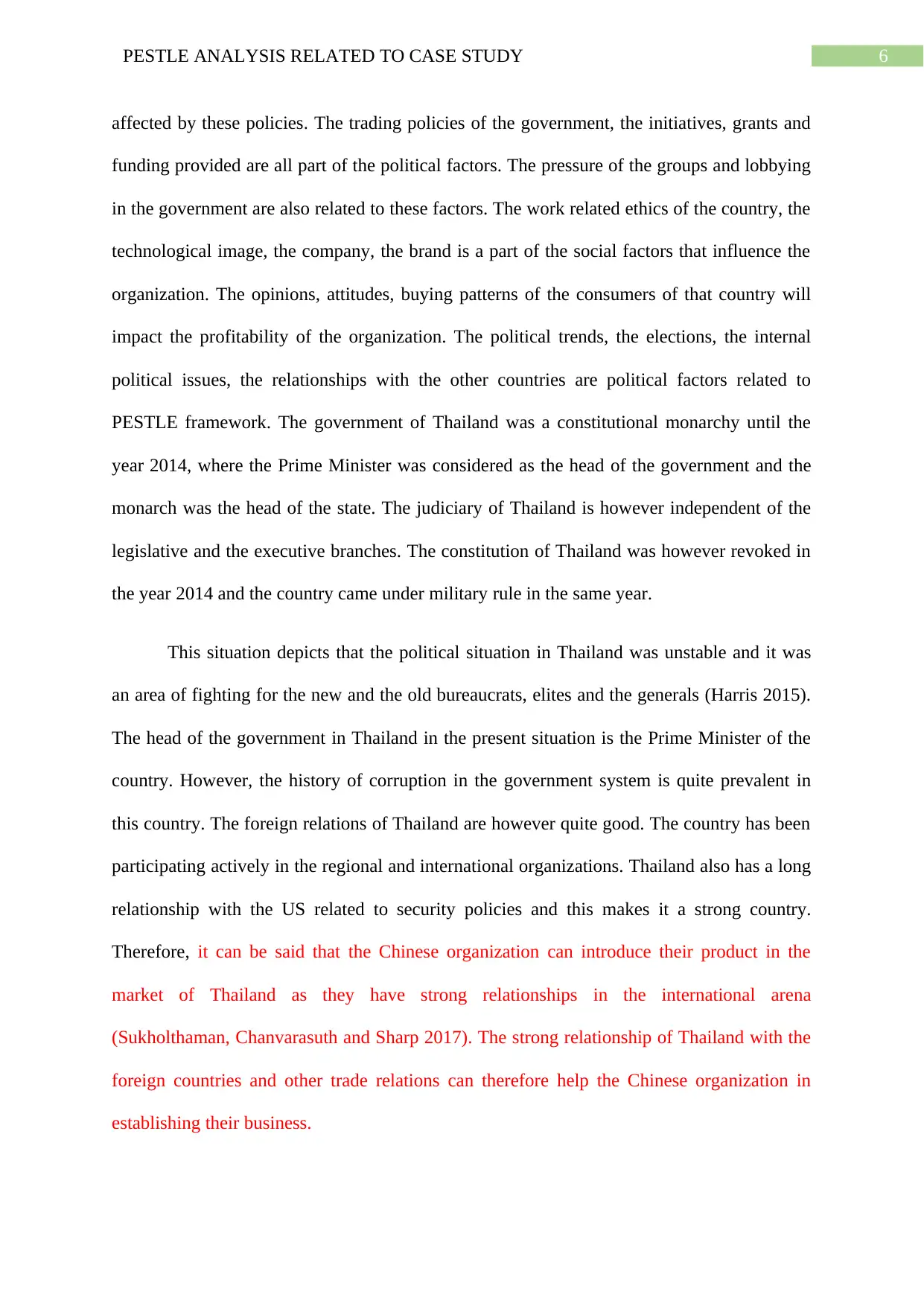
6PESTLE ANALYSIS RELATED TO CASE STUDY
affected by these policies. The trading policies of the government, the initiatives, grants and
funding provided are all part of the political factors. The pressure of the groups and lobbying
in the government are also related to these factors. The work related ethics of the country, the
technological image, the company, the brand is a part of the social factors that influence the
organization. The opinions, attitudes, buying patterns of the consumers of that country will
impact the profitability of the organization. The political trends, the elections, the internal
political issues, the relationships with the other countries are political factors related to
PESTLE framework. The government of Thailand was a constitutional monarchy until the
year 2014, where the Prime Minister was considered as the head of the government and the
monarch was the head of the state. The judiciary of Thailand is however independent of the
legislative and the executive branches. The constitution of Thailand was however revoked in
the year 2014 and the country came under military rule in the same year.
This situation depicts that the political situation in Thailand was unstable and it was
an area of fighting for the new and the old bureaucrats, elites and the generals (Harris 2015).
The head of the government in Thailand in the present situation is the Prime Minister of the
country. However, the history of corruption in the government system is quite prevalent in
this country. The foreign relations of Thailand are however quite good. The country has been
participating actively in the regional and international organizations. Thailand also has a long
relationship with the US related to security policies and this makes it a strong country.
Therefore, it can be said that the Chinese organization can introduce their product in the
market of Thailand as they have strong relationships in the international arena
(Sukholthaman, Chanvarasuth and Sharp 2017). The strong relationship of Thailand with the
foreign countries and other trade relations can therefore help the Chinese organization in
establishing their business.
affected by these policies. The trading policies of the government, the initiatives, grants and
funding provided are all part of the political factors. The pressure of the groups and lobbying
in the government are also related to these factors. The work related ethics of the country, the
technological image, the company, the brand is a part of the social factors that influence the
organization. The opinions, attitudes, buying patterns of the consumers of that country will
impact the profitability of the organization. The political trends, the elections, the internal
political issues, the relationships with the other countries are political factors related to
PESTLE framework. The government of Thailand was a constitutional monarchy until the
year 2014, where the Prime Minister was considered as the head of the government and the
monarch was the head of the state. The judiciary of Thailand is however independent of the
legislative and the executive branches. The constitution of Thailand was however revoked in
the year 2014 and the country came under military rule in the same year.
This situation depicts that the political situation in Thailand was unstable and it was
an area of fighting for the new and the old bureaucrats, elites and the generals (Harris 2015).
The head of the government in Thailand in the present situation is the Prime Minister of the
country. However, the history of corruption in the government system is quite prevalent in
this country. The foreign relations of Thailand are however quite good. The country has been
participating actively in the regional and international organizations. Thailand also has a long
relationship with the US related to security policies and this makes it a strong country.
Therefore, it can be said that the Chinese organization can introduce their product in the
market of Thailand as they have strong relationships in the international arena
(Sukholthaman, Chanvarasuth and Sharp 2017). The strong relationship of Thailand with the
foreign countries and other trade relations can therefore help the Chinese organization in
establishing their business.
Paraphrase This Document
Need a fresh take? Get an instant paraphrase of this document with our AI Paraphraser
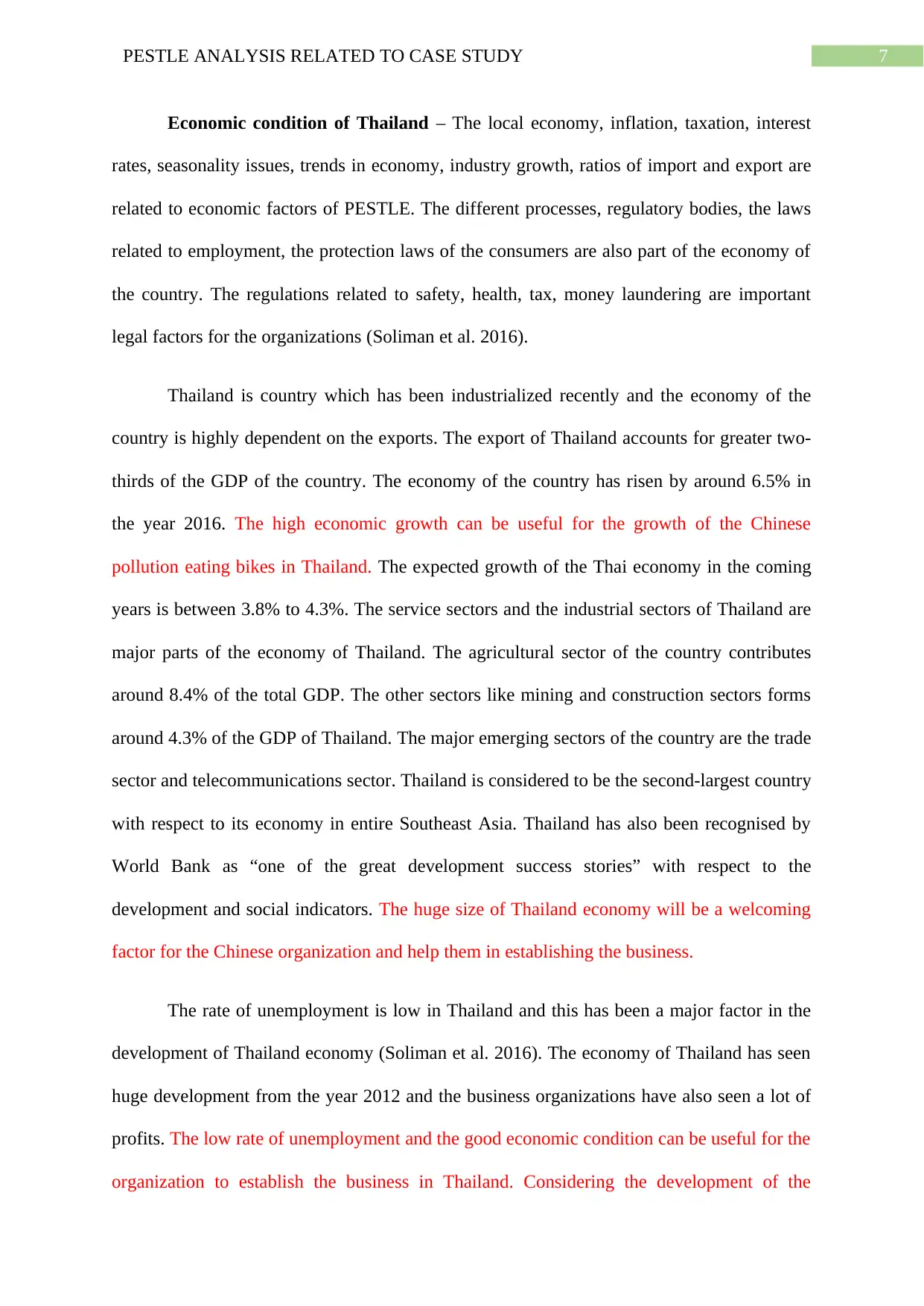
7PESTLE ANALYSIS RELATED TO CASE STUDY
Economic condition of Thailand – The local economy, inflation, taxation, interest
rates, seasonality issues, trends in economy, industry growth, ratios of import and export are
related to economic factors of PESTLE. The different processes, regulatory bodies, the laws
related to employment, the protection laws of the consumers are also part of the economy of
the country. The regulations related to safety, health, tax, money laundering are important
legal factors for the organizations (Soliman et al. 2016).
Thailand is country which has been industrialized recently and the economy of the
country is highly dependent on the exports. The export of Thailand accounts for greater two-
thirds of the GDP of the country. The economy of the country has risen by around 6.5% in
the year 2016. The high economic growth can be useful for the growth of the Chinese
pollution eating bikes in Thailand. The expected growth of the Thai economy in the coming
years is between 3.8% to 4.3%. The service sectors and the industrial sectors of Thailand are
major parts of the economy of Thailand. The agricultural sector of the country contributes
around 8.4% of the total GDP. The other sectors like mining and construction sectors forms
around 4.3% of the GDP of Thailand. The major emerging sectors of the country are the trade
sector and telecommunications sector. Thailand is considered to be the second-largest country
with respect to its economy in entire Southeast Asia. Thailand has also been recognised by
World Bank as “one of the great development success stories” with respect to the
development and social indicators. The huge size of Thailand economy will be a welcoming
factor for the Chinese organization and help them in establishing the business.
The rate of unemployment is low in Thailand and this has been a major factor in the
development of Thailand economy (Soliman et al. 2016). The economy of Thailand has seen
huge development from the year 2012 and the business organizations have also seen a lot of
profits. The low rate of unemployment and the good economic condition can be useful for the
organization to establish the business in Thailand. Considering the development of the
Economic condition of Thailand – The local economy, inflation, taxation, interest
rates, seasonality issues, trends in economy, industry growth, ratios of import and export are
related to economic factors of PESTLE. The different processes, regulatory bodies, the laws
related to employment, the protection laws of the consumers are also part of the economy of
the country. The regulations related to safety, health, tax, money laundering are important
legal factors for the organizations (Soliman et al. 2016).
Thailand is country which has been industrialized recently and the economy of the
country is highly dependent on the exports. The export of Thailand accounts for greater two-
thirds of the GDP of the country. The economy of the country has risen by around 6.5% in
the year 2016. The high economic growth can be useful for the growth of the Chinese
pollution eating bikes in Thailand. The expected growth of the Thai economy in the coming
years is between 3.8% to 4.3%. The service sectors and the industrial sectors of Thailand are
major parts of the economy of Thailand. The agricultural sector of the country contributes
around 8.4% of the total GDP. The other sectors like mining and construction sectors forms
around 4.3% of the GDP of Thailand. The major emerging sectors of the country are the trade
sector and telecommunications sector. Thailand is considered to be the second-largest country
with respect to its economy in entire Southeast Asia. Thailand has also been recognised by
World Bank as “one of the great development success stories” with respect to the
development and social indicators. The huge size of Thailand economy will be a welcoming
factor for the Chinese organization and help them in establishing the business.
The rate of unemployment is low in Thailand and this has been a major factor in the
development of Thailand economy (Soliman et al. 2016). The economy of Thailand has seen
huge development from the year 2012 and the business organizations have also seen a lot of
profits. The low rate of unemployment and the good economic condition can be useful for the
organization to establish the business in Thailand. Considering the development of the
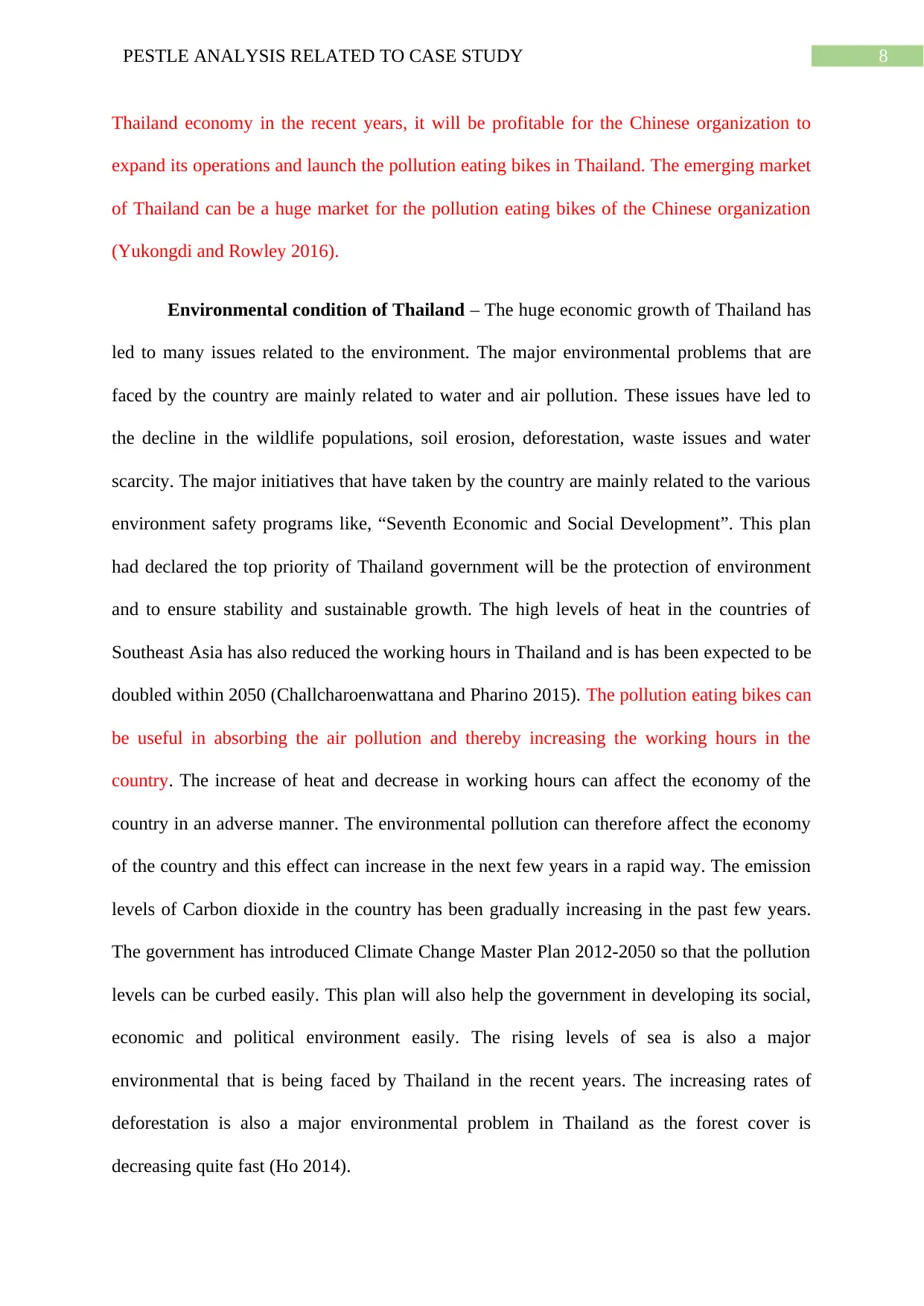
8PESTLE ANALYSIS RELATED TO CASE STUDY
Thailand economy in the recent years, it will be profitable for the Chinese organization to
expand its operations and launch the pollution eating bikes in Thailand. The emerging market
of Thailand can be a huge market for the pollution eating bikes of the Chinese organization
(Yukongdi and Rowley 2016).
Environmental condition of Thailand – The huge economic growth of Thailand has
led to many issues related to the environment. The major environmental problems that are
faced by the country are mainly related to water and air pollution. These issues have led to
the decline in the wildlife populations, soil erosion, deforestation, waste issues and water
scarcity. The major initiatives that have taken by the country are mainly related to the various
environment safety programs like, “Seventh Economic and Social Development”. This plan
had declared the top priority of Thailand government will be the protection of environment
and to ensure stability and sustainable growth. The high levels of heat in the countries of
Southeast Asia has also reduced the working hours in Thailand and is has been expected to be
doubled within 2050 (Challcharoenwattana and Pharino 2015). The pollution eating bikes can
be useful in absorbing the air pollution and thereby increasing the working hours in the
country. The increase of heat and decrease in working hours can affect the economy of the
country in an adverse manner. The environmental pollution can therefore affect the economy
of the country and this effect can increase in the next few years in a rapid way. The emission
levels of Carbon dioxide in the country has been gradually increasing in the past few years.
The government has introduced Climate Change Master Plan 2012-2050 so that the pollution
levels can be curbed easily. This plan will also help the government in developing its social,
economic and political environment easily. The rising levels of sea is also a major
environmental that is being faced by Thailand in the recent years. The increasing rates of
deforestation is also a major environmental problem in Thailand as the forest cover is
decreasing quite fast (Ho 2014).
Thailand economy in the recent years, it will be profitable for the Chinese organization to
expand its operations and launch the pollution eating bikes in Thailand. The emerging market
of Thailand can be a huge market for the pollution eating bikes of the Chinese organization
(Yukongdi and Rowley 2016).
Environmental condition of Thailand – The huge economic growth of Thailand has
led to many issues related to the environment. The major environmental problems that are
faced by the country are mainly related to water and air pollution. These issues have led to
the decline in the wildlife populations, soil erosion, deforestation, waste issues and water
scarcity. The major initiatives that have taken by the country are mainly related to the various
environment safety programs like, “Seventh Economic and Social Development”. This plan
had declared the top priority of Thailand government will be the protection of environment
and to ensure stability and sustainable growth. The high levels of heat in the countries of
Southeast Asia has also reduced the working hours in Thailand and is has been expected to be
doubled within 2050 (Challcharoenwattana and Pharino 2015). The pollution eating bikes can
be useful in absorbing the air pollution and thereby increasing the working hours in the
country. The increase of heat and decrease in working hours can affect the economy of the
country in an adverse manner. The environmental pollution can therefore affect the economy
of the country and this effect can increase in the next few years in a rapid way. The emission
levels of Carbon dioxide in the country has been gradually increasing in the past few years.
The government has introduced Climate Change Master Plan 2012-2050 so that the pollution
levels can be curbed easily. This plan will also help the government in developing its social,
economic and political environment easily. The rising levels of sea is also a major
environmental that is being faced by Thailand in the recent years. The increasing rates of
deforestation is also a major environmental problem in Thailand as the forest cover is
decreasing quite fast (Ho 2014).
⊘ This is a preview!⊘
Do you want full access?
Subscribe today to unlock all pages.

Trusted by 1+ million students worldwide
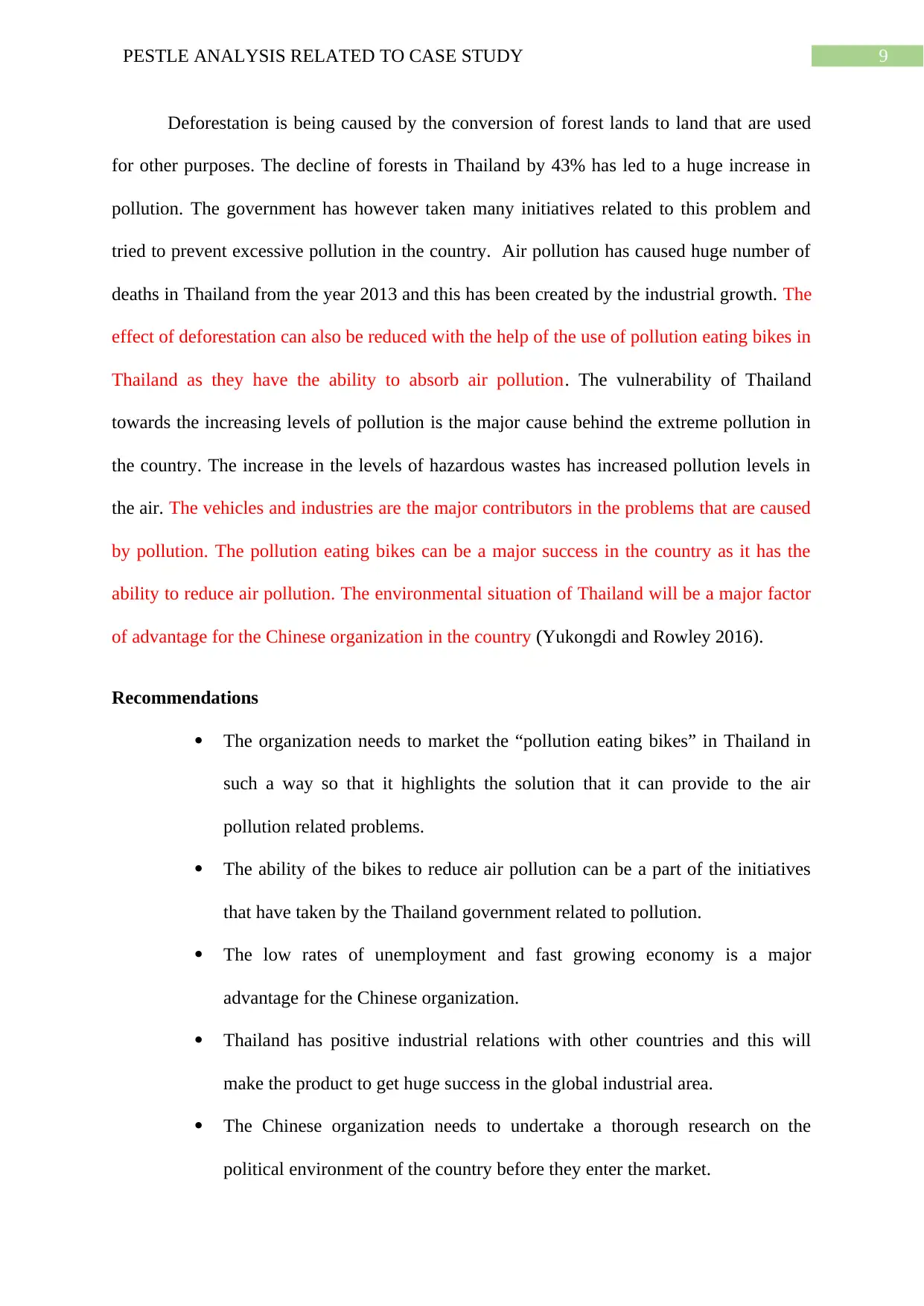
9PESTLE ANALYSIS RELATED TO CASE STUDY
Deforestation is being caused by the conversion of forest lands to land that are used
for other purposes. The decline of forests in Thailand by 43% has led to a huge increase in
pollution. The government has however taken many initiatives related to this problem and
tried to prevent excessive pollution in the country. Air pollution has caused huge number of
deaths in Thailand from the year 2013 and this has been created by the industrial growth. The
effect of deforestation can also be reduced with the help of the use of pollution eating bikes in
Thailand as they have the ability to absorb air pollution. The vulnerability of Thailand
towards the increasing levels of pollution is the major cause behind the extreme pollution in
the country. The increase in the levels of hazardous wastes has increased pollution levels in
the air. The vehicles and industries are the major contributors in the problems that are caused
by pollution. The pollution eating bikes can be a major success in the country as it has the
ability to reduce air pollution. The environmental situation of Thailand will be a major factor
of advantage for the Chinese organization in the country (Yukongdi and Rowley 2016).
Recommendations
The organization needs to market the “pollution eating bikes” in Thailand in
such a way so that it highlights the solution that it can provide to the air
pollution related problems.
The ability of the bikes to reduce air pollution can be a part of the initiatives
that have taken by the Thailand government related to pollution.
The low rates of unemployment and fast growing economy is a major
advantage for the Chinese organization.
Thailand has positive industrial relations with other countries and this will
make the product to get huge success in the global industrial area.
The Chinese organization needs to undertake a thorough research on the
political environment of the country before they enter the market.
Deforestation is being caused by the conversion of forest lands to land that are used
for other purposes. The decline of forests in Thailand by 43% has led to a huge increase in
pollution. The government has however taken many initiatives related to this problem and
tried to prevent excessive pollution in the country. Air pollution has caused huge number of
deaths in Thailand from the year 2013 and this has been created by the industrial growth. The
effect of deforestation can also be reduced with the help of the use of pollution eating bikes in
Thailand as they have the ability to absorb air pollution. The vulnerability of Thailand
towards the increasing levels of pollution is the major cause behind the extreme pollution in
the country. The increase in the levels of hazardous wastes has increased pollution levels in
the air. The vehicles and industries are the major contributors in the problems that are caused
by pollution. The pollution eating bikes can be a major success in the country as it has the
ability to reduce air pollution. The environmental situation of Thailand will be a major factor
of advantage for the Chinese organization in the country (Yukongdi and Rowley 2016).
Recommendations
The organization needs to market the “pollution eating bikes” in Thailand in
such a way so that it highlights the solution that it can provide to the air
pollution related problems.
The ability of the bikes to reduce air pollution can be a part of the initiatives
that have taken by the Thailand government related to pollution.
The low rates of unemployment and fast growing economy is a major
advantage for the Chinese organization.
Thailand has positive industrial relations with other countries and this will
make the product to get huge success in the global industrial area.
The Chinese organization needs to undertake a thorough research on the
political environment of the country before they enter the market.
Paraphrase This Document
Need a fresh take? Get an instant paraphrase of this document with our AI Paraphraser
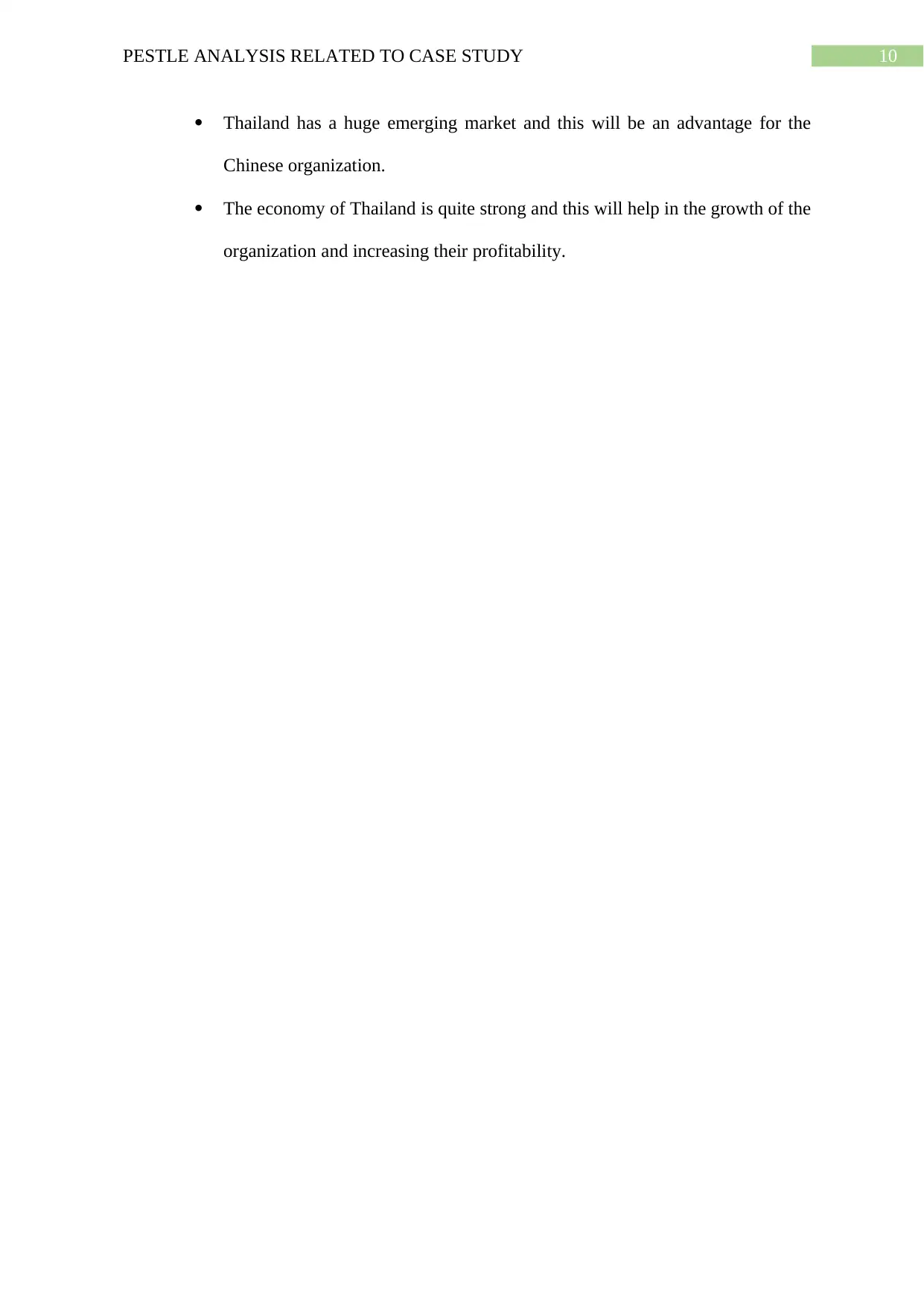
10PESTLE ANALYSIS RELATED TO CASE STUDY
Thailand has a huge emerging market and this will be an advantage for the
Chinese organization.
The economy of Thailand is quite strong and this will help in the growth of the
organization and increasing their profitability.
Thailand has a huge emerging market and this will be an advantage for the
Chinese organization.
The economy of Thailand is quite strong and this will help in the growth of the
organization and increasing their profitability.
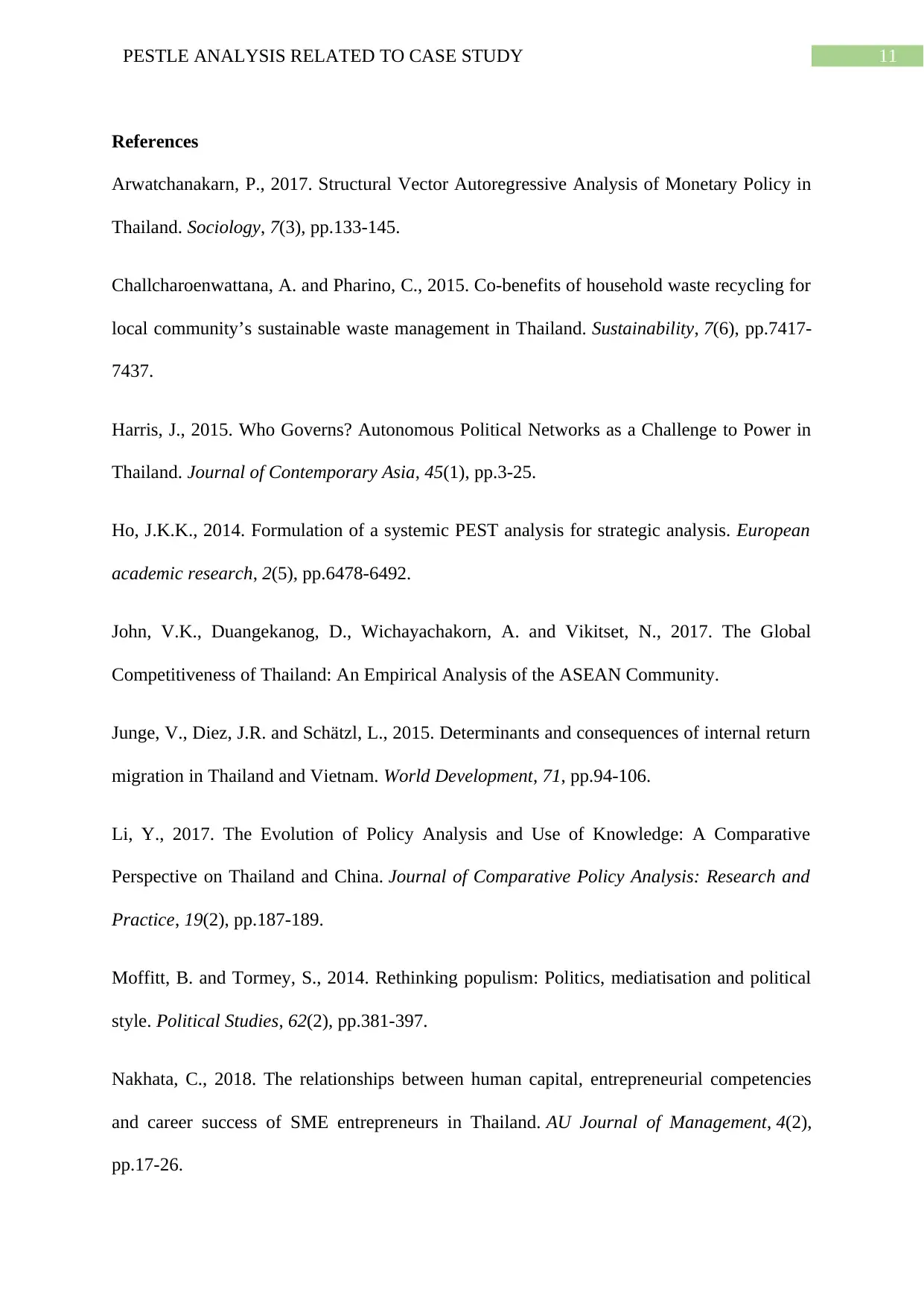
11PESTLE ANALYSIS RELATED TO CASE STUDY
References
Arwatchanakarn, P., 2017. Structural Vector Autoregressive Analysis of Monetary Policy in
Thailand. Sociology, 7(3), pp.133-145.
Challcharoenwattana, A. and Pharino, C., 2015. Co-benefits of household waste recycling for
local community’s sustainable waste management in Thailand. Sustainability, 7(6), pp.7417-
7437.
Harris, J., 2015. Who Governs? Autonomous Political Networks as a Challenge to Power in
Thailand. Journal of Contemporary Asia, 45(1), pp.3-25.
Ho, J.K.K., 2014. Formulation of a systemic PEST analysis for strategic analysis. European
academic research, 2(5), pp.6478-6492.
John, V.K., Duangekanog, D., Wichayachakorn, A. and Vikitset, N., 2017. The Global
Competitiveness of Thailand: An Empirical Analysis of the ASEAN Community.
Junge, V., Diez, J.R. and Schätzl, L., 2015. Determinants and consequences of internal return
migration in Thailand and Vietnam. World Development, 71, pp.94-106.
Li, Y., 2017. The Evolution of Policy Analysis and Use of Knowledge: A Comparative
Perspective on Thailand and China. Journal of Comparative Policy Analysis: Research and
Practice, 19(2), pp.187-189.
Moffitt, B. and Tormey, S., 2014. Rethinking populism: Politics, mediatisation and political
style. Political Studies, 62(2), pp.381-397.
Nakhata, C., 2018. The relationships between human capital, entrepreneurial competencies
and career success of SME entrepreneurs in Thailand. AU Journal of Management, 4(2),
pp.17-26.
References
Arwatchanakarn, P., 2017. Structural Vector Autoregressive Analysis of Monetary Policy in
Thailand. Sociology, 7(3), pp.133-145.
Challcharoenwattana, A. and Pharino, C., 2015. Co-benefits of household waste recycling for
local community’s sustainable waste management in Thailand. Sustainability, 7(6), pp.7417-
7437.
Harris, J., 2015. Who Governs? Autonomous Political Networks as a Challenge to Power in
Thailand. Journal of Contemporary Asia, 45(1), pp.3-25.
Ho, J.K.K., 2014. Formulation of a systemic PEST analysis for strategic analysis. European
academic research, 2(5), pp.6478-6492.
John, V.K., Duangekanog, D., Wichayachakorn, A. and Vikitset, N., 2017. The Global
Competitiveness of Thailand: An Empirical Analysis of the ASEAN Community.
Junge, V., Diez, J.R. and Schätzl, L., 2015. Determinants and consequences of internal return
migration in Thailand and Vietnam. World Development, 71, pp.94-106.
Li, Y., 2017. The Evolution of Policy Analysis and Use of Knowledge: A Comparative
Perspective on Thailand and China. Journal of Comparative Policy Analysis: Research and
Practice, 19(2), pp.187-189.
Moffitt, B. and Tormey, S., 2014. Rethinking populism: Politics, mediatisation and political
style. Political Studies, 62(2), pp.381-397.
Nakhata, C., 2018. The relationships between human capital, entrepreneurial competencies
and career success of SME entrepreneurs in Thailand. AU Journal of Management, 4(2),
pp.17-26.
⊘ This is a preview!⊘
Do you want full access?
Subscribe today to unlock all pages.

Trusted by 1+ million students worldwide
1 out of 14
Related Documents
Your All-in-One AI-Powered Toolkit for Academic Success.
+13062052269
info@desklib.com
Available 24*7 on WhatsApp / Email
![[object Object]](/_next/static/media/star-bottom.7253800d.svg)
Unlock your academic potential
Copyright © 2020–2026 A2Z Services. All Rights Reserved. Developed and managed by ZUCOL.





